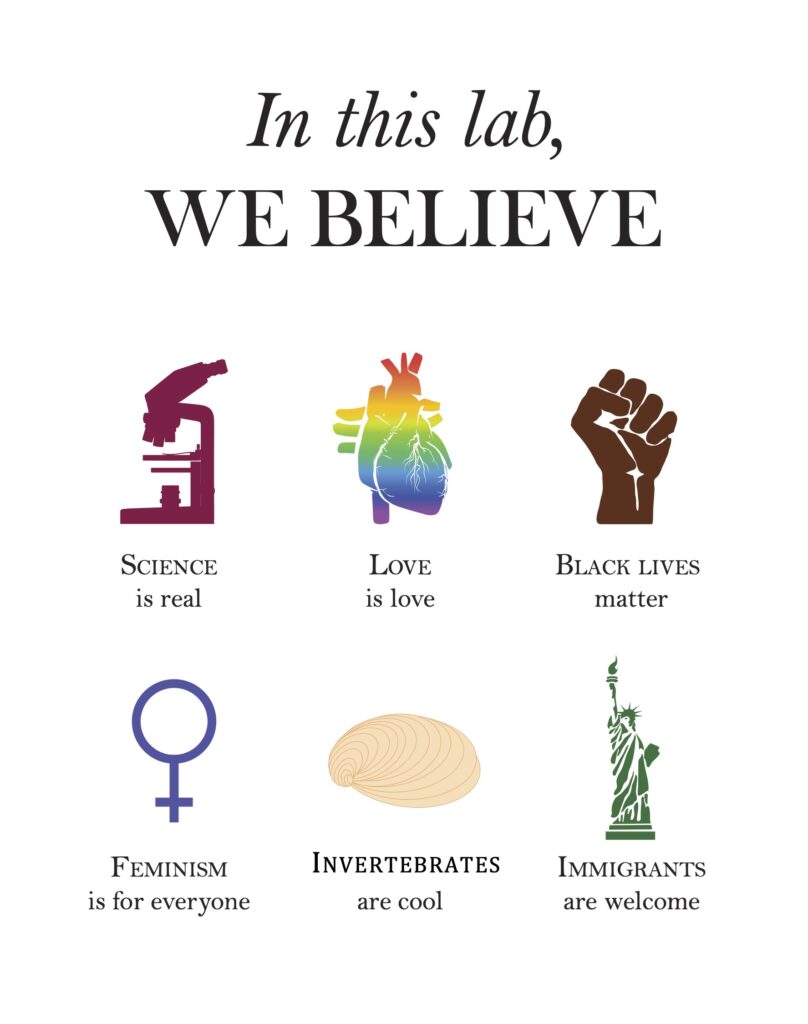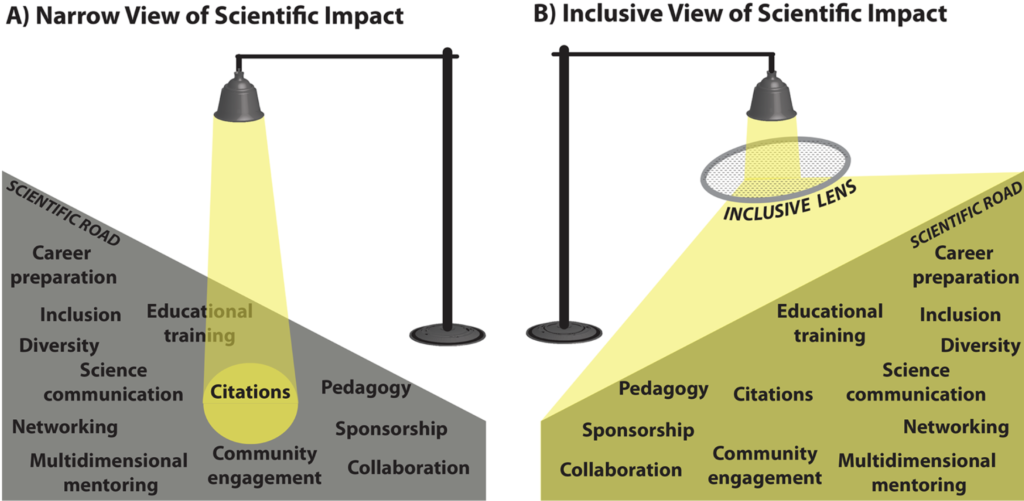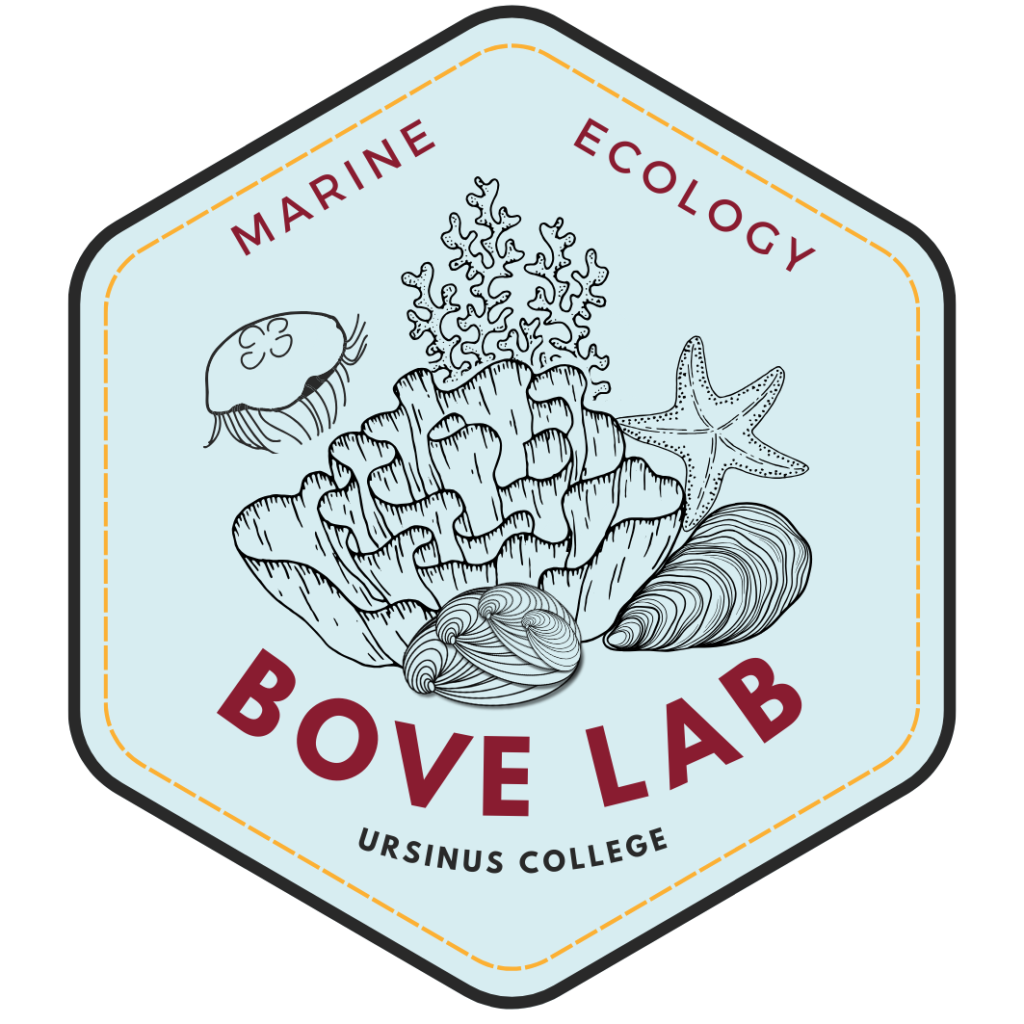Last updated on 20 October 2022
I am committed to creating an equitable and inclusive environment for everyone, regardless of race, gender, gender identity, sexual orientation, ability/disability, age, religion, nationality, immigration status, or socio-economic background. I acknowledge we all come from diverse lived experiences and these experiences shape our every day lives. I will actively fight discrimination and racial inequality across academia and society as a whole.
This page will continue to be a work in progress as I am still learning. I welcome any and all feedback on ways to improve in my efforts to support a diverse, equitable, and inclusive environment.

I actively incorporate discussions and pedagogical tools to support individuals coming from systemically marginalized groups in all of my teaching and mentoring. Below are some examples on how I do this.
I make my spaces safe and welcoming to all individuals because my role as an ally is to not only invite individuals from systemically marginalized groups to participate, but to ensure their safety and let their voices be heard (Moore 2022).
I highlight that STEM, especially ecology and biology, is entrenched in racism, colonialism, sexism, ableism, etc. that creates a highly exclusive system in my courses (Barber et al. 2020; Cronin et al. 2021; Trisos et al. 2021). We discuss these implications because racism and colonialism ARE ecological issues.
Introductory STEM courses disproportionately discourage and force out underrepresented minority groups out of STEM (Hatfield et al., 2022). I have restructured my courses to encourage students to explore learning and to reward creativity and improvement, rather than fact memorization, as a way to prioritize students from all backgrounds.
I include many opportunities for hands-on and experiential learning in my teaching to introduce students to the field of ecology and marine science because these experiences are often only in “pay to play” opportunities that are not accessible and equitable (McGill et al., 2021).
Academia often praises successful mentoring as publishing in high-impact journals and collecting citations. However, this greatly dismisses the diversity of impacts we can have as scientists. Such metrics are clearly biased, thus we urge the importance of multidimensional and inclusive metrics that promote diverse contributions and emphasize mentoring, diversity, equity, and inclusion. Here, we outline ways to make this happen:
Davies SW, Putnam HM, Ainsworth T, Baum JK, Bove CB, Crosby SC, Côté IM, Duplouy A, Fulweiler RW, Griffin AJ, Hanley TC, Hill T, Humanes A, Mangubhai S, Metaxas A, Parker LM, Rivera HE, Silbiger NJ, Smith NS, Spalding AK, Traylor-Knowles N, Weigel BL, Wright RM, Bates AE. Promoting inclusive metrics of success and impact to dismantle a discriminatory reward system in science. 2021 PLoS Biology. doi: 10.1371/journal.pbio.3001282.

I am engaged in promoting a diverse, safe, open, and inclusive space for all individuals throughout all my scholarship activities. Below is a list of some previous and ongoing efforts, but I am always open to additional suggests for new opportunities and resources!
I am involved in work aimed at recruitment and retention of individuals from systemically marginalized groups across academic stages. Below are several programs that aim to address these retention/recruitment issues across career stages
Below are some other actions and values I include at the forefront of my scholarship to make STEM a more inclusive and safe space.
While this is by no means a comprehensive list, below are some resources (in addition to the references below) that I have found helpful in my efforts to create a space of equity and inclusion for all people and lived experiences.
Feel like I am missing some important resources here? Let me know! I am always looking for new resources for myself and to share with others.
Barber, P. H., T. B. Hayes, T. L. Johnson, L. Márquez-Magaña, and 10,234 SIGNATORIES. 2020. Systemic racism in higher education. Science 369:1440–1441. Link
Cronin, M. R., S. H. Alonzo, S. K. Adamczak, D. N. Baker, R. S. Beltran, A. L. Borker, A. B. Favilla, R. Gatins, L. C. Goetz, N. Hack, J. G. Harenčár, E. A. Howard, M. C. Kustra, R. Maguiña, L. Martinez-Estevez, R. S. Mehta, I. M. Parker, K. Reid, M. B. Roberts, S. B. Shirazi, T.-A. M. Tatom-Naecker, K. M. Voss, E. Willis-Norton, B. Vadakan, A. M. Valenzuela-Toro, and E. S. Zavaleta. 2021. Anti-racist interventions to transform ecology, evolution and conservation biology departments. Nature Ecology & Evolution 5:1213–1223. Link
Hatfield, N., Brown, N., and Topaz, C. M. (2022). Do introductory courses disproportionately drive minoritized students out of STEM pathways? PNAS Nexus 1, pgac167. Link
McGill, BM, Foster, MJ, Pruitt, AN, et al. You are welcome here: A practical guide to diversity, equity, and inclusion for undergraduates embarking on an ecological research experience. Ecol Evol. 2021; 11: 3636– 3645. Link
Moore T Black in Marine Science: A new wave is here. PLoS Biol. 2022; 20(10): e3001833. Link
Trisos, C. H., J. Auerbach, and M. Katti. 2021. Decoloniality and anti-oppressive practices for a more ethical ecology. Nature Ecology & Evolution 5:1205–1212. Link
